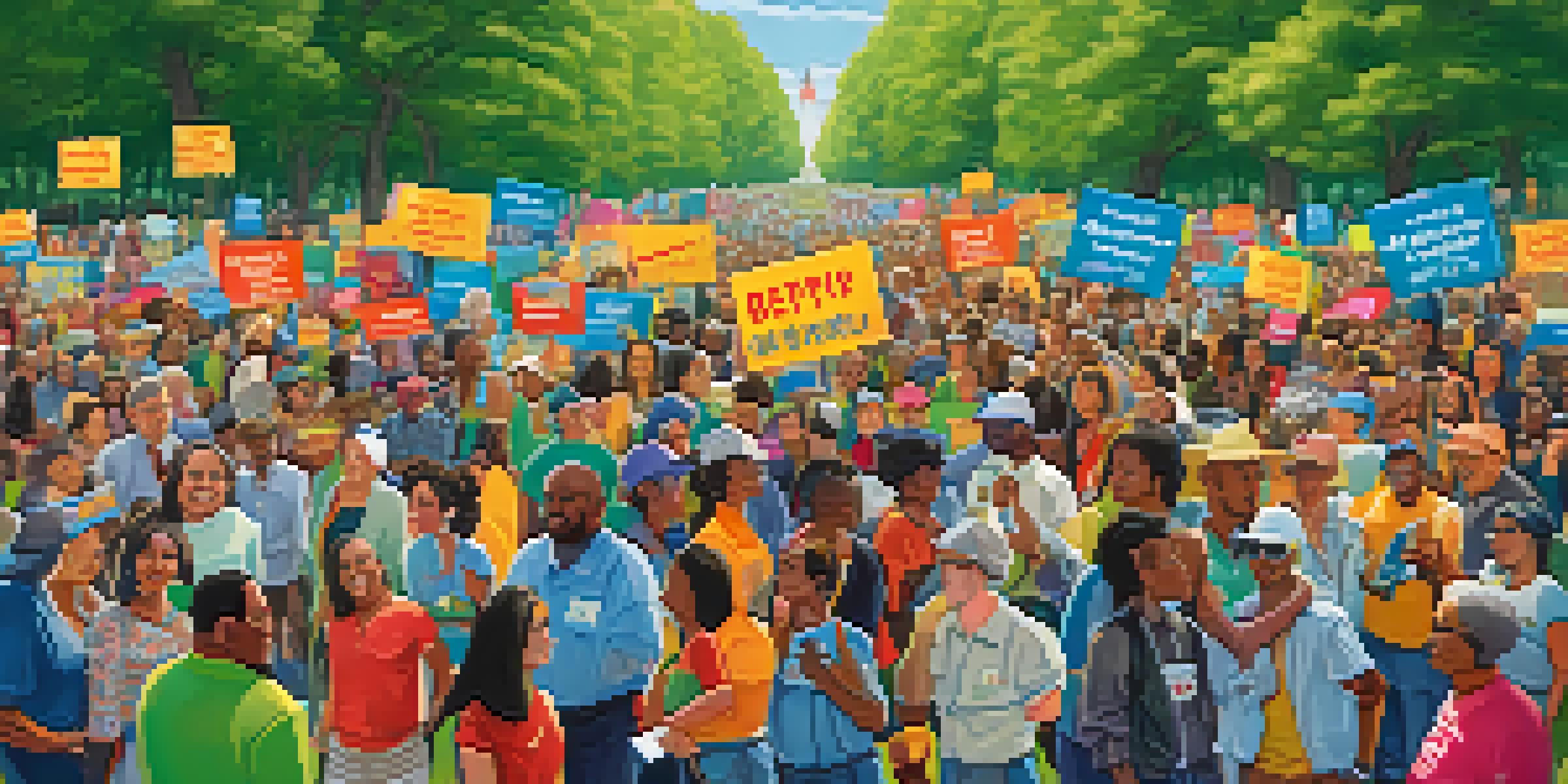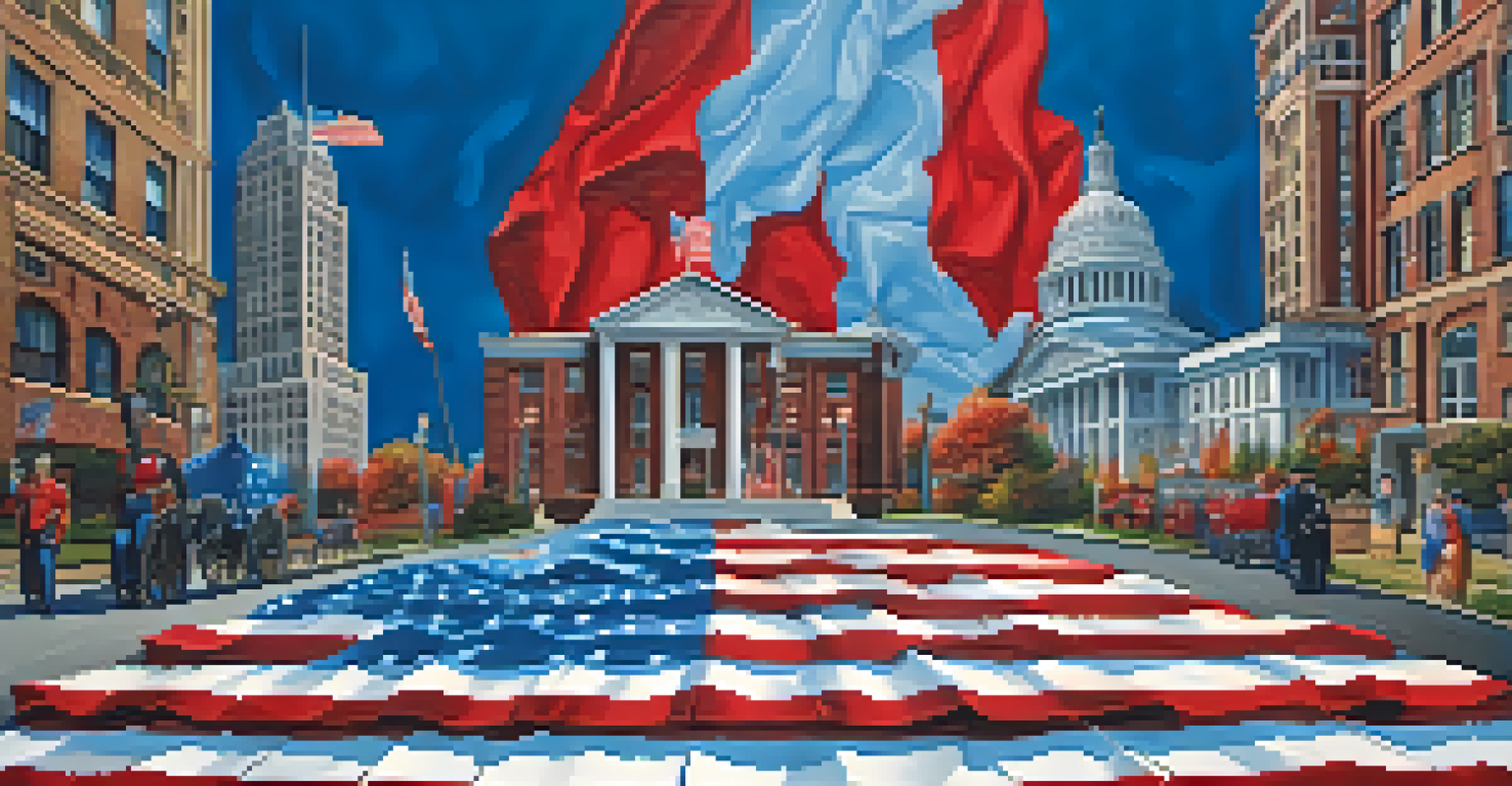Major Political Parties in New Jersey: An Overview

Introduction to New Jersey's Political Landscape
New Jersey's political landscape is a vibrant tapestry woven with a rich history and diverse perspectives. Known for its strong party affiliations, the state features a dynamic interplay between several political parties. This overview will delve into the major political parties that shape New Jersey's policies and governance.
In a democracy, the people get the government they deserve.
Understanding the political parties in New Jersey provides insight into the state's governance and electoral processes. Each party brings its unique ideology and priorities, influencing everything from local policies to national elections. Consequently, citizens often align with parties that reflect their values and aspirations.
As we explore the major political parties, we'll examine their histories, core ideologies, and current standings. This will help paint a clearer picture of how these parties impact everyday life for New Jersey residents.
The Democratic Party: A Major Force in New Jersey
The Democratic Party holds a significant stronghold in New Jersey, often dominating statewide elections. With a focus on social justice, healthcare, and education, the party appeals to a diverse electorate. Its policies often reflect progressive ideals aimed at creating a more equitable society.

Historically, the Democratic Party has been influential in New Jersey since the mid-20th century, gaining momentum during the civil rights movement and beyond. Prominent figures, such as former Governor Phil Murphy, have helped steer the party toward a more progressive agenda, emphasizing issues like climate change and economic reform.
Democrats Lead New Jersey Politics
The Democratic Party dominates New Jersey's political landscape, focusing on social justice, healthcare, and education.
Today, the party's success is evident in its control of many key political offices and its ability to mobilize grassroots support. This influence not only shapes state legislation but also plays a critical role in national Democratic strategies.
The Republican Party: Resilience in a Blue State
Although New Jersey is often considered a blue state, the Republican Party maintains a loyal base of supporters and continues to play a pivotal role in the political arena. The party traditionally champions fiscal conservatism, lower taxes, and limited government intervention. These principles resonate with many voters, particularly in suburban and rural areas.
The ballot is stronger than the bullet.
Despite facing challenges in statewide elections, the Republican Party has seen success in certain local and congressional races. This resilience can be attributed to strong campaigning and a focus on issues that matter to constituents, such as public safety and economic development.
Current Republican leaders in New Jersey are working to bridge the gap between traditional conservative values and the changing demographics of the state. Their ability to adapt could determine the future of the party's influence in New Jersey's political landscape.
The Role of Third Parties in New Jersey Politics
While the Democratic and Republican parties dominate New Jersey's political scene, third parties also play a crucial role in shaping the conversation. Parties like the Green Party and the Libertarian Party provide alternative perspectives on various issues, from environmental policies to individual liberties. These parties often attract voters who feel underrepresented by the two major parties.
Third parties can also influence elections by drawing votes away from the major parties, impacting the overall outcome. For example, a strong showing from a third-party candidate in a close election might shift the balance of power. This phenomenon highlights the importance of diverse voices in a healthy democracy.
Republicans Maintain a Loyal Base
Despite being a blue state, the Republican Party retains a committed following by advocating for fiscal conservatism and local issues.
Moreover, third parties often bring attention to specific issues that may be overlooked, pushing larger parties to address them. This advocacy can lead to broader discussions and, in some cases, policy changes that benefit the electorate as a whole.
Key Issues Shaping Political Parties in New Jersey
Various issues significantly influence the platforms and strategies of New Jersey's political parties. Topics such as affordable housing, education funding, and transportation infrastructure are frequently at the forefront of political discussions. Each party has its stance on these issues, reflecting their core values and beliefs.
For instance, Democrats often advocate for increased funding for public schools and affordable housing initiatives. They prioritize social equity and aim to address systemic issues that affect underprivileged communities. In contrast, Republicans may focus on tax incentives for businesses and promoting school choice.
Understanding these key issues helps voters make informed decisions at the polls. As New Jersey continues to evolve, the political parties will need to adapt their platforms to resonate with the changing needs and priorities of their constituents.
The Impact of Elections on Political Party Dynamics
Elections are pivotal moments that can reshape the political landscape in New Jersey and influence party dynamics. Each election cycle presents opportunities for parties to gain or lose power, affecting everything from local policies to state governance. The outcomes often reflect the public's sentiment on key issues, offering insight into the electorate's priorities.
For example, gubernatorial and legislative elections can significantly impact party representation and influence policy direction. A strong showing for one party can lead to legislative changes that align with their platform, while losses may force parties to rethink their strategies and outreach efforts.
Third Parties Influence Electoral Dynamics
Third parties like the Green Party and Libertarian Party play a critical role by offering alternative perspectives and impacting election outcomes.
Moreover, elections also energize grassroots movements and mobilize voters. Engaged citizens can lead to increased voter turnout, which is essential for the health of democracy and can shift power dynamics between the parties.
The Future of Political Parties in New Jersey
As New Jersey continues to evolve, the future of its political parties remains an intriguing topic. Changes in demographics, social issues, and economic challenges will likely shape party platforms and priorities. The ability to adapt to these shifts will be crucial for both major and minor parties as they seek to connect with voters.
For instance, as younger generations become more politically active, parties may need to embrace progressive values and prioritize issues like climate change and social justice. Meanwhile, traditional values may still resonate with older voters, demanding a delicate balance from both major parties.

Ultimately, the future of political parties in New Jersey will depend on their responsiveness to constituents and their ability to foster inclusive dialogue. Engaging with diverse voices and addressing the needs of all residents will be key to maintaining relevance in an ever-changing political landscape.